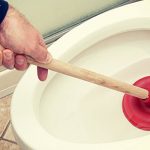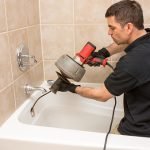Condo buildings becoming more and more popular for people of all ages and demographics, especially in the City of Toronto with seemingly endless condo development underway. The responsibilities of condo boards and individual owners can often become unclear. After all, if a pipe bursts in a person’s unit, is it their responsibility to fix it, or is it the board’s? Here is a basic breakdown of Toronto condo plumbing responsibility that you can reference.
You should know that it’s always a good idea to bring up these issues with your individual board. Every building, and the people who run it, are different, and different agreements means that you could be on the hook (or off) for different things.
Condo Boards are Responsible for the Building’s Plumbing
The major responsibility of condo boards in condo buildings is to the building as a while over individual units. So plumbing problems that occur outside the units, like drainage away from the building and connections to the municipal water, are still the responsibility of the board over the individual. And any repairs that result from a failure to fix those types of problems are generally their problem as well, although many boards will try and fight individuals in this regard if there’s a chance that the problem wasn’t actually their fault.
In general, however, it’s best to think of the board as the sort of street maintenance on a more conventional neighbourhood, and your condo as the individual home. The street crew that accidentally bursts a pipe while working must fix it, but the pipes in your home are not their problem.
Individual Owners are Responsible for Ongoing Maintenance in the Units
Ongoing plumbing maintenance is not a board’s responsibility, so be aware that regular pipe inspections and repairs are part of your annual home maintenance checkup. This includes things like leaky faucets, shower heads that aren’t putting out the pressure they once did, and, in some cases, issues relating to hot water (if your unit has its own hot water tank).
We often think of plumbing as where the water comes out, but the pipes inside the walls will also be your problem and responsibility to upkeep and maintain. So if a pipe bursts in the wall, that may be your problem. Of course, responsibility can get hazy when buildings and units share pipes, walls, and resources. This means you should have problems addressed as soon as possible to limit damage to other units, but to have any problems investigated to ensure your unit wasn’t solely responsible.
 Once You Figure It Out, it’s Easy
Once You Figure It Out, it’s Easy
Condo plumbing in Toronto is a lot more complicated than the plumbing of an individual home, mostly because the tight quarters and individuals involved are much different from a traditional street neighbourhood. If you have plumbing issues in your condo, it’s generally going to be your responsibility to fix and maintain them. Call a drain contractor in Toronto to get to the bottom of all your issues.
But for the larger issues, the responsibility will fall onto the board or condo corporation. No matter what the issue, however, open and honest communication, and a thorough knowledge of your rights as a condo owner, are key. Be sure to be familiar with your condo agreement, and bring any and all issues to the board for consideration and review.







Hello, about 6 weeks ago, there was a flood from a common drain in my utility room and the building brought in a plumber and snaked it. The problem appeared to be fixed however the laminate floor bubbled and showed obvious signs of water damage. The building would not divulge what the problem was or give me a copy of the plumber report. A couple of days ago, water seeped up between the floor boards in a different part of the floor. I called the building and they are going to send a plumber out to inspect it. Am I better to let the building manager bring in a plumber or hire one myself so that I can obtain the report and know what is going on? I checked under the dishwasher, turned on all the taps, turned on the washing machine, checked all pipes that are visible and there is no sign of a leak.
Also, how will they find the problem when there is currently no evidence of any water leaking? I may have to take up the floor boards to find out where the problem is. Is it better to have a plumber come once I get the boards up?
You could try to reach out to the original plumber yourself regarding the report. It would also not be a bad idea to secure your own plumber and have an inspection, simply from a due diligence standpoint. If you need a hand or further information don’t hesitate to give us a call @ 416-252-5557. Thanks for your comment.
I decided to change my bathtub into a walk in bathtub and that’s when the plumber found out that we have kitec Pipes, those kids of pipes may fail anytime causing a big problems I contacted the management and they advice me to change them I’ve been living here for almost 2 years and nobody told me about that I don’t know who’s responsible for that
Hi Zeina, your plumber is absolutely right Kitec plumbing should be replaced as it is very prone to failure. We’ve covered Kitec plumbing in the past you might find some more information there.
So I was in the process of attempting to shut off the main toilet water valve in order to install a TOTO bidet attachment (it simply replaces the toilet seat and then using an adapter attaches to the main toilet water supply) the issue I am having is that the main shut off valve doesn’t not seem to shut off. I’ve cranked as much as possible and worry that any tighter I could damage it! I just purchased the place a few weeks ago and looking at the valve it seems a little old… Is there any risk in over cranking the shut off, and is replacing the shut off valve my responsibility? Thanks!
Hi Marky, little bit late to respond here but we recommend you contact us to take a look into your specific plumbing issue. Experience of a plumber in this situation could save you from a major headache. Hope you solved this without any major problems!
I live on the ground floor of a two year old 4 storey old condominium. I have already had two sewage backups in my suite from blockages in the main sewage line. The Property Manager says it’s too soon to Hydrojet this two year building and won’t even agree to maintain the drain cleanouts annually.
When should a building have it’s first Hydrojet service and how often should cleanouts be serviced?
Hi I’ve noticed what sounds like a tapping or drip sound coming from where my stackable washer/dryer is located in my condo unit. Happens periodically and I’ve checked thoroughly around for any water around machine or walls but there is none. Should I be concerned or is this just expansion and contracting from pipes ? Any insight would be greatly appreciated.
We had a leak coming out of our condo that went down into a unit below. We had no clue where is was coming from until a plumber came and removed the toilet to get into the wall behind. What he noticed right away was the pipe for the toilet was more than half a foot below the floor and they had stack 4 or 5 rubber flanges on top of each other ( not sealed ) to make up for the missing space. The flanges were cracked and leaking out toilet water. The plumber said the only way to fix it was to go into the unit below open the ceiling and move the entire pipe up half a foot so its correct. The property management and the board both agree that this was a mistake during the construction of the building but are still insisting that we have to pay to have this corrected and pay for the damage in the unit below ? would this fall under maintenance and repair ?? nothing wrong with the pipe itself …toilet is fine … any insight would be very appreciated